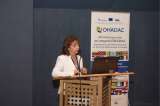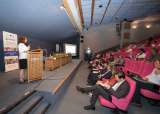 Sylvie Monjean-Decaudin, Professor of Law specialized in legal translation at the University of Cergy Pontoise (Paris) - Director of the Interdisciplinary Research Centre in Juritranslatology (CERIJE), France whose team has translated the OHADAC texts, gave a talk at the conference entitled “Translating OHADAC texts - A field report”.
Sylvie Monjean-Decaudin, Professor of Law specialized in legal translation at the University of Cergy Pontoise (Paris) - Director of the Interdisciplinary Research Centre in Juritranslatology (CERIJE), France whose team has translated the OHADAC texts, gave a talk at the conference entitled “Translating OHADAC texts - A field report”.
As an introduction, Professor Monjean-Decaudin noted that legal translation is of increasing interest to academics, particularly since globalization multiplies the number of translated laws. This has led to the creation of a discipline referred to in the francophone environment as “juritranslatology” (Legal Translatology Studies) which in turn saw, in 2012, the Professor establish the CERIJE - in the form of an association based in France. On 19 and 20 June 2014, CERIJE held its first and founding symposium on juritranslatology at UNESCO House. The centre's activities are focused on two main areas:
- fundamental research on the right to translation and the translation of law
- applied research which is disseminated primarily through continuing professional development (How can law be translated?),
A third activity has been added to the above - the translation of all OHADAC texts of a supranational nature.
In the first part of her talk, entitled “juritranslatology, or the study of the theory and practice of legal translation”, she explained that an understanding of the various functions of legal translation and identifying the challenges of translation in a globalized environment allows the many communicative requirements arising in legal contexts to be addressed, thereby producing a better translation. Transnational legal matters are likely to involve the meeting of two languages and two legal systems in the translation process (one known as the “source” and the other “target”), and translation always performs a specific function relating to the communicative situation that has given rise to the text. Professor Monjean-Decaudin set out the three functions of legal translation, which are:
- creating the law
- applying the law
- presenting/reporting on the law.
From a methodological point of view, she added that:
- in principle, translations reflect source texts, limiting the translator's margin for manoeuvre
- the “degree of juridicity” must be assessed before commencing the translation. It is formed of two elements - the legal complexity of the source text and the legal effects of the translation.
 She reiterated that legal translation is a pragmatic process and regarding OHADAC texts, the function of translating the corpus of articles consists of creating law.
She reiterated that legal translation is a pragmatic process and regarding OHADAC texts, the function of translating the corpus of articles consists of creating law.
The second part of Professor Monjean-Decaudin's talk, entitled “Translating OHADAC texts - A field report”, described how this work constitutes “vertical translation” relating to negotiated supranational law created across the various legal systems of the Member States of the organization for which that law is intended. Conversely, when translation is “horizontal” or national, it relates to law being translated into the language and law of another State.
Given that OHADAC texts are of a vertical nature, drafting consistency and neutrality in these texts must be strictly observed in order to achieve successful translations. Such care will reduce the difficulties that the teams encountered, for example when transferring the meaning of certain legal concepts between Spanish, French and English.
Professor Monjean-Decaudin concluded that the translation methodology applied in the work on the OHADAC texts demonstrates that the “transaction” of translating law is the fruit of a successive step-by-step process. In order to achieve optimum results with the translated texts, intervening as far upstream as possible, she has proposed to provide OHADAC with ongoing support through co-drafting in its three official languages.
For further information, please contact:
Dr. Jean Alain Penda
Email: japenda@ohadac.com
Published on 2015-11-06, 2:30 pm















